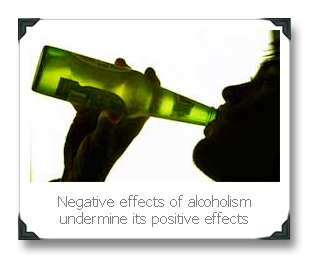 Alcohol has been used by people in many forms. Its use as mood enhancer since prehistoric times is well known. Taking it in moderate quantity does not create serious harm; problem arises when excess alcohol is consumed. Due to physical or psychological reasons,
Alcohol has been used by people in many forms. Its use as mood enhancer since prehistoric times is well known. Taking it in moderate quantity does not create serious harm; problem arises when excess alcohol is consumed. Due to physical or psychological reasons,
Consumption of excess alcohol is commonly called alcoholism. It is responsible for various traffic accidents, marital unhappiness and broken homes. It is also a social problem; neighbors of alcoholics can easily understand this.
Factors that foster alcoholism
Page Contents

- Mostly people start occasional drinking to socialize which gradually becomes frequent and finally the person becomes full fledge alcoholic.
- Some people take alcoholic drink to overcome anxiety, to induce sleep, or to escape an uncomfortable situation.
- Some are binge drinkers who can spend weeks or months without alcohol but once they have started drinking it is difficult for them to stop.
What’s in a drink ?
Ethyl alcohol or ethanol is the main ingredient of alcoholic beverages. It is not digested as common foods do. As alcohol enters the alimentary canal it is quickly absorbed in the blood stream within an hour. The liver metabolizes it. Two drinks per day for a man and one drink for a woman is the recommended limit which is never followed by chronic drinkers. Over consumption causes a hangover.
Alcoholism and its nutritional effect

According to recent medical studies moderate consumption of alcohol reduces heart attack risk, can protect the brain against age related dementia, and improve appetite and acts as mood enhancer. But excess consumption causes malnutrition.
Deficiency of vitamin D makes alcoholics prone to fractures and osteoporosis. They may suffer impaired liver and pancreatic function. Alcohol stimulates insulin production that can result in low blood sugar. Thiamine deficiency, riboflavin deficiency, vitaminB6 deficiency, and selenium deficiency is also common among chronic drinkers.
Helpful diet
At first a firm resolution should be taken not to consume alcohol in any form. Thus intensity of other problems would be reduced and they can be tackled one by one.Supplements may be recommended to treat deficiencies and nutritious food is required to reduce the harm caused by over consumption of alcohol.
To get extra thiamine sea food lean pork and enriched cereals are good choices. Dark green leafy vegetables, liver, bread, orange juice, legumes lentil, rice, pasta and other starchy food should also be consumed.

Lifebing is driven by an unrelenting passion for promoting health and well-being, our team is wholly committed to curating exceptional content and immersive experiences.
